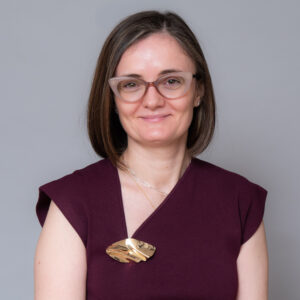
Natacha Crooks is an Assistant Professor at UC Berkeley and a visiting researcher at Azure Systems Research (Security & Privacy). She works at the intersection of distributed systems and databases. Most recently, she is focused on developing scalable database and storage systems with strong integrity guarantees. She is a recipient of a Sloan fellowship, NSF Career Award, IEEE TCDE Rising Star Award, VMWare Early Career Faculty and ACM SIGOPS Dennis Ritchie Doctoral Dissertation Award.

Alexandra Silva is a theoretical computer scientist whose main research focuses on semantics of programming languages and the use of algebraic methods in network verification. Alexandra is currently a Professor at Cornell University, and she was previously a Professor at University College London. She was the recipient of an ERC Consolidator in 2020, the Royal Society Wolfson Award 2019, Needham Award 2018, the Presburger Award 2017, the Leverhulme prize 2016, and an ERC starting Grant in 2015.

Maria Christakis is a full professor at TU Wien, where she leads the Software Engineering research unit. Her work focuses on developing innovative techniques and tools for writing, specifying, verifying, analyzing, testing, and debugging software. Her goal is to make programs more robust while enhancing the developer experience.
Before joining TU Wien in 2022, Maria conducted research at the Max Planck Institute for Software Systems (Germany), the University of Kent (UK), Microsoft Research (USA), and ETH Zurich (Switzerland). Since then, she was awarded an ERC Starting grant, WWTF and FWF grants, a Google Research Scholar award, an Amazon Research award, and she was elected member of the Young Academy of the Austrian Academy of Sciences.
 Stefanie Jegelka is a Humboldt Professor at TU Munich and an Associate Professor in the Department of EECS at MIT. Before joining MIT, she was a postdoctoral researcher at UC Berkeley, and obtained her PhD from ETH Zurich and the Max Planck Institute for Intelligent Systems. Stefanie has received a Sloan Research Fellowship, an NSF CAREER Award, a DARPA Young Faculty Award, the German Pattern Recognition Award, a Best Paper Award at ICML and an invited sectional lecture at the International Congress of Mathematicians. She has co-organized multiple workshops on (discrete) optimization in machine learning, graph representation learning, weight space learning and other related topics, and has served as an Action Editor at JMLR and a program chair of ICML 2022.
Stefanie Jegelka is a Humboldt Professor at TU Munich and an Associate Professor in the Department of EECS at MIT. Before joining MIT, she was a postdoctoral researcher at UC Berkeley, and obtained her PhD from ETH Zurich and the Max Planck Institute for Intelligent Systems. Stefanie has received a Sloan Research Fellowship, an NSF CAREER Award, a DARPA Young Faculty Award, the German Pattern Recognition Award, a Best Paper Award at ICML and an invited sectional lecture at the International Congress of Mathematicians. She has co-organized multiple workshops on (discrete) optimization in machine learning, graph representation learning, weight space learning and other related topics, and has served as an Action Editor at JMLR and a program chair of ICML 2022.
 Zeynep Akata is a Liesel Beckmann Distinguished professor of Computer Science at Technical University of Munich and the director of the Institute for Explainable Machine Learning at Helmholtz Munich. After completing her PhD at the INRIA Rhone Alpes (2014), she worked as a post-doctoral researcher at the Max Planck Institute for Informatics (2014-2017), at University of California Berkeley (2016-2017), as an assistant professor at the University of Amsterdam (2017-2019) while at the same time she was a group leader at the Max Planck Institute for Informatics, and as a full professor at the Cluster of Excellence Machine Learning at the University of Tübingen (2019-2023). She is the recipient of an ERC Starting Grant (2019), the DAGM Pattern Recognition Award (2021), the ECVA Young Researcher Award (2022), the Alfried Krupp Award (2023), Germany’s Top 40 under 40 (2024). She is an AEIC of IEEE TPAMI and an ELLIS Fellow. Her field of research is explainable multimodal machine learning.
Zeynep Akata is a Liesel Beckmann Distinguished professor of Computer Science at Technical University of Munich and the director of the Institute for Explainable Machine Learning at Helmholtz Munich. After completing her PhD at the INRIA Rhone Alpes (2014), she worked as a post-doctoral researcher at the Max Planck Institute for Informatics (2014-2017), at University of California Berkeley (2016-2017), as an assistant professor at the University of Amsterdam (2017-2019) while at the same time she was a group leader at the Max Planck Institute for Informatics, and as a full professor at the Cluster of Excellence Machine Learning at the University of Tübingen (2019-2023). She is the recipient of an ERC Starting Grant (2019), the DAGM Pattern Recognition Award (2021), the ECVA Young Researcher Award (2022), the Alfried Krupp Award (2023), Germany’s Top 40 under 40 (2024). She is an AEIC of IEEE TPAMI and an ELLIS Fellow. Her field of research is explainable multimodal machine learning.
 Elissa M. Redmiles is the Clare Luce Boothe Assistant Professor at Georgetown University in the Computer Science Department and a Faculty Associate at the Berkman Klein Center for Internet & Society at Harvard University. She has additionally served as a consultant and/or researcher at multiple institutions, including Microsoft Research, Meta, the Max Planck Institute for Software Systems, the World Bank, the Center for Democracy and Technology, and the Partnership on AI. Leveraging techniques from demography, economics, and computer science, Dr. Redmiles combines human-subjects experiments and computational measurements to 1) model and quantify threats in human-technology interactions, 2) innovate threat mitigations that are impossible to identify with social scientific or technical analysis alone and 3) deploy those mitigations via regulator and platform partnerships. Dr. Redmiles has presented her research at the White House, European Commission, and the National Academies of Sciences, Engineering and Medicine among other venues and her work has been featured in venues such as the New York Times, Wall Street Journal, Scientific American, Rolling Stone, Wired, and Forbes. She is the recipient of the 2024 ACM SIGSAC Early Career Award for exceptional contributions to the field of computer security and privacy and her research has received multiple paper recognitions at USENIX Security, ACM CCS, ACM CHI, ACM CSCW, and ACM EAAMO.
Elissa M. Redmiles is the Clare Luce Boothe Assistant Professor at Georgetown University in the Computer Science Department and a Faculty Associate at the Berkman Klein Center for Internet & Society at Harvard University. She has additionally served as a consultant and/or researcher at multiple institutions, including Microsoft Research, Meta, the Max Planck Institute for Software Systems, the World Bank, the Center for Democracy and Technology, and the Partnership on AI. Leveraging techniques from demography, economics, and computer science, Dr. Redmiles combines human-subjects experiments and computational measurements to 1) model and quantify threats in human-technology interactions, 2) innovate threat mitigations that are impossible to identify with social scientific or technical analysis alone and 3) deploy those mitigations via regulator and platform partnerships. Dr. Redmiles has presented her research at the White House, European Commission, and the National Academies of Sciences, Engineering and Medicine among other venues and her work has been featured in venues such as the New York Times, Wall Street Journal, Scientific American, Rolling Stone, Wired, and Forbes. She is the recipient of the 2024 ACM SIGSAC Early Career Award for exceptional contributions to the field of computer security and privacy and her research has received multiple paper recognitions at USENIX Security, ACM CCS, ACM CHI, ACM CSCW, and ACM EAAMO.
